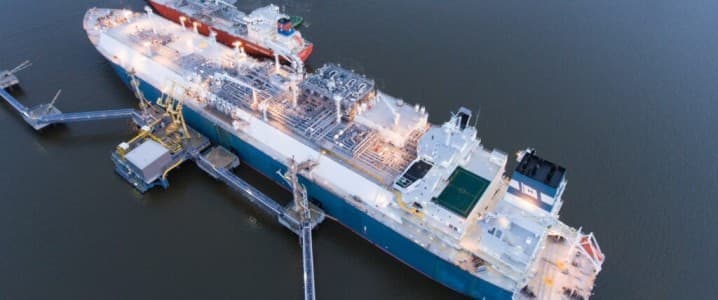
- An LNG dispute is threatening to turn into an international problem
- Shell, BP, Eni, Repsol, and Italian company, Edison have filed arbitration cases against Venture Global.
- If the buyers’ claims are true, such conduct could have a significant negative impact on the future growth of U.S. LNG export capacity.
Last year, when the European Union found itself in a position to urgently find a replacement for pipeline Russian gas, U.S. LNG producers were hailed as saviors. Dozens of tankers with super chilled liquid gas began arriving at European ports and, from there, into storage for the winter. Just a few months later, the saviors turned, in the eyes of the buyers, into selfish, greedy profit-chasers. Now, an LNG dispute is threatening to turn into an international problem. A very big one.
For Europe last year, the U.S. LNG industry was pretty much a godsend—despite the hefty price tag. For the U.S. LNG industry, the situation was similar: with so much new capacity being planned, producers needed some large buyers for the long term. And some of them found them in the face of European Big Oil. Even before the 2022 energy crunch, however, European majors were looking for LNG growth opportunities where they could find them. The U.S. was a natural target for these opportunity seekers with its vast gas reserves and growing production. So several European companies, including Shell, BP, Eni, Repsol, and another Italian company, Edison, became investors in one U.S. LNG project led by a company named Venture Global.
All five companies were foundation buyers, meaning they provided Venture Global with the money to build its Calcasieu Pass liquefaction facility in Louisiana in exchange for a commitment from Venture Global to supply them with certain volumes of LNG over a long-term period.
The place has a capacity of 10 million tons, and it started producing these tons in early 2022—right on time for Europe. But instead of honoring its contracts with the European buyers, Venture Global chose to sell more LNG on the spot market. So now the Europeans are suing.
All five energy companies have filed arbitration cases against the U.S. LNG producer, the latest being Spain’s Repsol, which approached the International Chamber of Commerce in September this year. Now, these five companies are turning to Brussels and Washington to help them in the dispute. Apparently, international courts are not enough to serve quick justice. Venture Global, which has not denied selling cargos on the spot market, claims that the Calcasieu Pass LNG plant is not fully operational, and that is why it has not been supplying full volumes under the long-term contracts with the five European companies. The reason it has not yet become fully operational, per Venture Global, is faulty equipment. That equipment, however, has not stopped the company from placing some 200 LNG cargos on the spot market, per reuters. “Such short-sighted, unprecedented conduct sets a concerning precedent that could erode market confidence and delay investment in the US LNG export infrastructure that is still critically needed to support Europe’s energy security,” Shell said in a recent letter to central EU and U.S. authorities, as quoted by the Financial Times, which reported on the latest development in the dispute.
Indeed, if the buyers’ claims are true, such conduct could have a significant negative impact on the future growth of U.S. LNG export capacity. But perhaps even more importantly than that, the case highlights how vulnerable the supply security of LNG is despite growing supply volumes. Ironically enough, the EU itself used to be a big fan of the LNG spot market—until last year. There was plenty of LNG around, and prices were low because Europe imported almost half of its gas from Russia, and only needed modest volumes of the super chilled fuel. There was no point in committing to long-term contracts. Until most of the Russian gas disappeared and Europe suddenly realized it could not just quit gas overnight.
LNG producers are also fans of the spot market because prices are higher there. They were especially higher last year, and many U.S. LNG producers took advantage of that, even when it meant they were violating the terms of their long-term contracts—they simply paid the penalty and still made more money as the world rushed to buy all the LNG it could. Now, BP, Shell, Eni, Repsol, and Edison want Brussels and Washington to pressure Venture Global to honor its contractual obligations. The fact that they have not succeeded in exerting the necessary pressure themselves is yet another sign that the global LNG market is more complicated than it seems. Venture Global has found that move “outrageous”, per the FT, and has called it a “request for interference” from the governments.
“It is nothing more than the latest in a series of unsuccessful attempts to bully an industry newcomer into waiving its contractual rights in order to increase their own profits beyond recent record highs,” Venture Global struck back in its own letter to Brussels and Washington, playing the outrage card that both the EU and the U.S. appeared to be very fond of last year when the energy majors made record profits from the energy crunch. Yet the company is also claiming it is, in fact, fulfilling its contractual obligations to the five buyers, which contradicts its own statement that the Calcasieu Pass facility is under a force majeure and not operating at full capacity. But that’s according to the FT report.
Source: OilPrice.com
